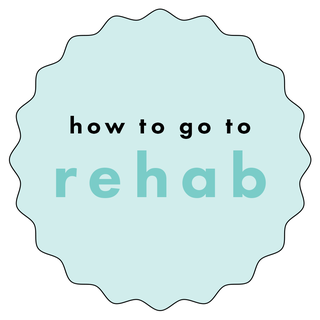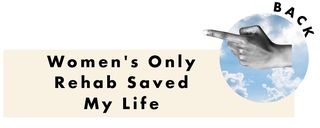There are 5 million young people in this country dealing with addiction as you read this, and a staggering 90 percent of them will never get the help they need. This story is a digital-exclusive element of our “How to Go to Rehab” package, designed to make seeking treatment easier and less intimidating than ever.
Johnelle Berlin went to her first Alcoholics Anonymous (AA) meeting six years ago, at the age of 22. “Everyone was going around the room, introducing themselves,” she recalls. “‘Hi, I’m so-and-so, and I’m an alcoholic.’ But when it was my turn, I said my name—and that was it. I felt uncomfortable.”
The crowd was older. They were parents, had families. She couldn’t relate to their struggles, or they hers. “I didn’t miss my daughter’s ballet recital because of my addiction,” she says. So she left the meeting and went back to drinking.

Over the next few years, she hit up different chapters in different parts of town, aware she needed help and not sure of where else to turn. But “it just wasn’t clicking for me,” Johnelle says.
Turns out, the nearly 100-year-old program isn’t clicking for a lot of millennials. Recent data from the organization shows that 75 percent of AA members are over the age of 41 (and what’s more, that 62 percent are male). These numbers reflect a cultural shift in how twenty-somethings, especially twenty-something women, are approaching our sobriety.
For one—we’re more likely to want to keep God out of it. “The AA program hinges on turning your life over to a higher power,” says Lance Dodes, MD, author of Breaking Addiction and a retired clinical professor of psychiatry at Harvard Medical School. “But there are fewer and fewer people who get much out of that.” Since 2007, Pew Research Trends has seen a decline the numbers of people who self-identify as Christians and a rise in people claiming “no religion.” Only 17 percent of millennial women are certain they believe in God. “The higher power step just wasn’t possible for me,” says Sunny Smith, 33, who has been sober for five years after battling an alcohol dependence so severe it left her with permanent vision damage. “I’m not anti-religion, but I don’t believe in anything enough to take that idea seriously. I want to control my own destiny.” (Step 2 of AA’s 12-step program is about becoming “aware that a Power greater than ourselves could restore us to sanity,” according to the organization’s website. But the site goes on to say, “Step 2 isn’t really about God – it’s about finding something outside of yourself to inspire you and help you remain sober.”)

AA also has an infamous abstinence-only approach, which holds that former addicts should swear off casual substance use forever. “The theory is: If you have one drink, you’ve relapsed,” says former heroin user Keri Blakinger, now 35, who got off drugs while serving a prison sentence for heroin possession and has been clean ever since. “After I got out of prison, I did not use any substances for a number of years. And then after maybe four years, I decided I was at a point where I was okay with drinking occasionally,” she says. “That is something that AA and NA [Narcotics Anonymous] would tell you is not possible.”
Johnelle also felt that AA idealized the idea of sobriety to the point that her lived experience could never measure up. “I felt like there was this mentality, Quit drinking today, and tomorrow you’re going to be thinner, better. Tomorrow, you’re going to be so amazing. But it wasn’t like that for me, and I was so hard on myself about it. It became a perpetual vicious cycle: when I felt ashamed, I would go straight to drinking.”
Dodes believes that some people really benefit from AA’s structure. “But for the other 90 percent of people, when they don’t succeed with AA, they feel bad about themselves,” he says. “Almost all people have episodes where they return to substance use. That’s normal. That doesn’t make you a failure. But with AA, if you have a slip, you go back to zero. This framing can become a self-fulfilling prophecy.” It’s also “extremely discouraging.”
Still, perhaps the most significant limitation of AA’s famous 12 steps is that none of them address the psychiatric disorders that often go hand-in-hand with addiction in women.
According to Mark Willenbring, MD, the CEO and founder of Alltyr, an outpatient addiction specialty clinic that focuses on psychiatry-based recovery, “The majority of those who come here for substance treatment have coexisting disorders: insomnia, anxiety, depression, mood disorders, PTSD, eating disorders and ADHD are the most common. If someone has an anxiety disorder and they drink, their anxiety will increase the next day. And then they’ll drink more because they’re more anxious.” In that case, it’s hard to hard to curb the alcohol use if you’re not also addressing the anxiety—which AA, unfortunately, just isn’t designed to do. And besides, some issues are meant to be addressed with a trusted therapist, not a room full of untrained strangers.
Keri recalls learning this the hard way. “In general, I found the groups I went to were not as attuned to young women’s trauma as I probably needed,” she says. “In one meeting, some old timer in his 60s cut me off and said the meeting wasn’t about me, the meeting was about the meeting.” As a victim of sexual assault, “I was unable to discuss some of the trauma that led to me needing to be there in the first place. It really made it feel like the rooms were not for me.”
Dodes says that a more modern approach is to recognize that there is no rigid, unilateral path to (or even definition of) sobriety, and that individualized treatments like one-on-one therapy are crucially important. “There are new and better ways to understand addiction, and I’d like to think that young people are more willing to listen to that,” he says.

In addition to formal therapy, millennials are forming communities online (where else?) to help them stay sober. Johnette found r/stopdrinking, a Reddit community of more than 180,000 members that is dedicated to helping people control or stop consuming alcohol, without promoting any specific dogmatic approach. “I posted on r/stopdrinking and people were so kind to me, and they provided so much information,” Johnette says. “I felt like I could really communicate with them, in a way I couldn’t at the meetings I’d been to. What was so magical about it was that it wasn’t one person, like a sponsor, or even a small group helping me. It was an outpouring. And it was instant. I didn’t have to wait for a sponsor to text me back, or for my turn to talk in a meeting.” She found plenty of women like her, who were the same age and at the same place in their lives.
There are other promising treatments on the horizon that will further revolutionize addiction recovery, from a shot that will block drugs from get you high (and like, what’s the point of that?) to virtual reality technology that will help prevent relapses.
Ultimately, what made Johnelle leave AA for good was its emphasis on admitting you have no power over your addiction—which is Step 1 of the 12 steps. “That didn’t resonate with me,” she says. “The power within me against alcohol definitely exists. It’s not a demon under my bed that’s going to come out and get me. I make a choice every single day whether I pick up that bottle or not. And I will never, ever admit that I’m powerless.” It’s been 18 months since her last drink. And yeah, she’s counting. That’s one part of the program she likes.


Source: Read Full Article
